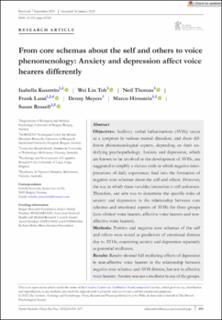From core schemas about the self and others to voice phenomenology: Anxiety and depression affect voice hearers differently
Kusztrits, Isabella; Toh, Wei Lin; Thomas, Neil; Larøi, Frank; Meyers, Denny; Hirnstein, Marco; Rossell, Susan
Journal article, Peer reviewed
Published version

Åpne
Permanent lenke
https://hdl.handle.net/11250/3021740Utgivelsesdato
2022Metadata
Vis full innførselSamlinger
Originalversjon
Psychology and Psychotherapy: Theory, Research and Practice. 2022, 95 (2), 493-507. 10.1111/papt.12384Sammendrag
Objectives
Auditory verbal hallucinations (AVHs) occur as a symptom in various mental disorders, and show different phenomenological aspects, depending on their underlying psychopathology. Anxiety and depression, which are known to be involved in the development of AVHs, are suggested to amplify a vicious cycle in which negative interpretations of daily experiences feed into the formation of negative core schemas about the self and others. However, the way in which these variables interrelate is still unknown. Therefore, our aim was to determine the specific roles of anxiety and depression in the relationship between core schemas and emotional aspects of AVHs for three groups (non-clinical voice hearers, affective voice hearers and non-affective voice hearers).
Methods
Positive and negative core schemas of the self and others were tested as predictors of emotional distress due to AVHs, examining anxiety and depression separately as potential mediators.
Results
Results showed full mediating effects of depression in non-affective voice hearers in the relationship between negative core schemas and AVH distress, but not in affective voice hearers. Anxiety was not a mediator in any of the groups.
Conclusions
These findings suggest different emotional mechanisms depending on the underlying psychopathology.
